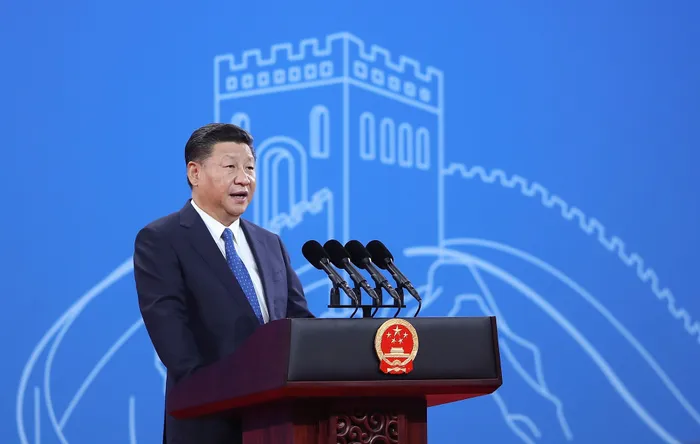
Chinese President Xi Jinping speaks during the 86th Interpol General Assembly at Beijing National Convention Center in Beijing. (Lintao Zhang/Pool Photo via AP) Chinese President Xi Jinping speaks during the 86th Interpol General Assembly at Beijing National Convention Center in Beijing. (Lintao Zhang/Pool Photo via AP)
Global security is at its most vulnerable. Organised and cybercrime is rife, and terrorism has become an unstoppable nightmare.
Tough times to be a superpower.
In the face of these mounting challenges, China recently announced it would plough more money and resources into the international fight against global security issues. Chinese President Xi Jinping unveiled a plan to boost global security in the next five years during the recent 86th general assembly meeting of Interpol in Beijing. Participants from 158 countries and regions attended.A special focus would also be concentrated on underdeveloped countries and regions of Africa, with Xi charging that “big nations must support small nations”.
Kenya Broadcasting Corporation reported that China, for its part, in the crackdown against terrorism and other crime would build and
upgrade existing communication systems and criminal investigation laboratories in 100 developing countries, most of which were in Africa.
The broadcaster reported that the Beijing administration also planned to set up an international law enforcement college to offer training to 20 000 law enforcement personnel from developing countries under its Ministry of Public Security.
China has been engaged in a comprehensive co-operation programme with more than 70 countries and regions in combating cybercrime.
The average cost of cyber-crime to businesses around the world increased to US$11.7m per organisation this year, according to the Cost of Cyber Crime Study released last month.
Accenture and the Ponemon Institute conducted the research and surveyed more than 2 000 security and IT professionals in 254 different organisations around the world.
This week the UN General Assembly’s Sixth Committee, a legal forum, met to discuss measures to eliminate international terrorism. Members agreed the terrain of the battle, as well as its nature, was constantly shifting.
China has sent 2 609 peacekeepers to serve in UN missions in nine regions, including Africa’s South Sudan, Darfur in Sudan, Mali and
Liberia, making it the largest contributor of troops among the five permanent members of the UN Security Council.
The UN Office on Drugs and Crime said transnational organised crime, from human trafficking, drugs, gun smuggling to money laundering, is estimated to generate US$870 billion a year, more than six times the amount of official development assistance and close to 7% of the world’s exports of merchandise.
Interpol aims to play bigger role co-ordinating security forces around the world so they can better fight crimes.
“Interpol needs to take on the role of organising international forces to conduct more global missions in the future,” said Meng Hongwei, president of the International Criminal Police Organisation.
Meng said technology and globalisation have changed the nature of crime. A battle which, in his opinion, no country was capable of taking on single-handedly.
“More than 70 000 terrorist attacks have occurred around the world between 2000 and 2016, but the international community has yet to find an effective solution.”
At the meeting the Chinese president conceded that ensuring global security was an arduous, complicated and prolonged mission.
China prides itself on its relatively low crime rate which it maintains is one of the main reasons it enjoys sustained economic growth and social stability. The Stockholm International Peace Research Institute has raised the issue over the security implications as China expands its economic footprint through initiatives such as its ambitious One Belt, One Road, a plan to revive the old Silk Road.
The institute says China has a strategy of how the Belt fits into its own evolving security concepts and interests.
As globalisation faces a backlash and China is engaging in more global affairs, amid an uncertain global order, strong leadership is needed, especially to tackle security.
* Peters is the live editor of Weekend Argus. She is on a 10-month scholarship with the China Africa Press Centre. Instagram: mels_chinese_takeout.
